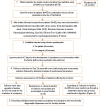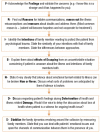A Qualitative Study to Assess Collusion and Psychological Distress in Cancer Patients
- PMID: 31114111
- PMCID: PMC6504745
- DOI: 10.4103/IJPC.IJPC_146_18
A Qualitative Study to Assess Collusion and Psychological Distress in Cancer Patients
Abstract
Introduction: Collusion is frequently encountered but least studied entity in palliative care services in India. Impact of collusion is manifold and identifying it requires good communication skills. Once identified, it gives an indication for existing healthy versus developing unhealthy collusion to be dealt within families.
Objective: The objective of this study was to identify the prevalence of collusion and its clinical and psychological correlates among patients and caregivers in a palliative cancer care.
Materials and methods: We describe systematic identification and unraveling of collusion across multiple levels in a palliative cancer care eventually drafting an algorithm to unravel the collusion. Patients and families were recruited from in-patient palliative care services after obtaining written informed consent. Qualitative interviews were conducted using collusion questionnaire, EQ5D, Visual Analog Scale, and NIMHANS psychiatric morbidity screen.
Results: Among 62 cancer families interviewed, we identified that 71% collusion exists between doctor and patient, 61.3% between doctor and caregiver, and 75.83% between patient and caregiver. Around 50% collusions were unraveled systematically. Collusion was more prevalent in patients with rapid progression of illness (<6 months), patients with poor coping skills, and preference of being interviewed alone.
Conclusion: This statistics suggests that collusion goes unnoticed in terminal illnesses and communication skills play a major role in identifying and dealing with collusion. This also unearths need to formulate interview techniques and structured assessment tools or questionnaire in palliative cancer care which are sparse.
Keywords: Cancer; collusion; communication; palliative.
Conflict of interest statement
There are no conflicts of interest.
Figures








References
-
- Bozcuk H, Erdoǧan V, Eken C, Ciplak E, Samur M, Ozdoǧan M, et al. Does awareness of diagnosis make any difference to quality of life. Determinants of emotional functioning in a group of cancer patients in Turkey? Support Care Cancer. 2002;10:51–7. - PubMed
-
- Emanuel EJ, Fairclough DL, Wolfe P, Emanuel LL. Talking with terminally ill patients and their caregivers about death, dying, and bereavement: Is it stressful? Is it helpful? Arch Intern Med. 2004;164:1999–2004. - PubMed
-
- Jeba J, Jacob A, Kandasamy R, George R. The patient who 'must not be told': Demographic factors associated with collusion in a retrospective study in South India. Postgrad Med J. 2016;92:659–62. - PubMed
LinkOut - more resources
Full Text Sources

